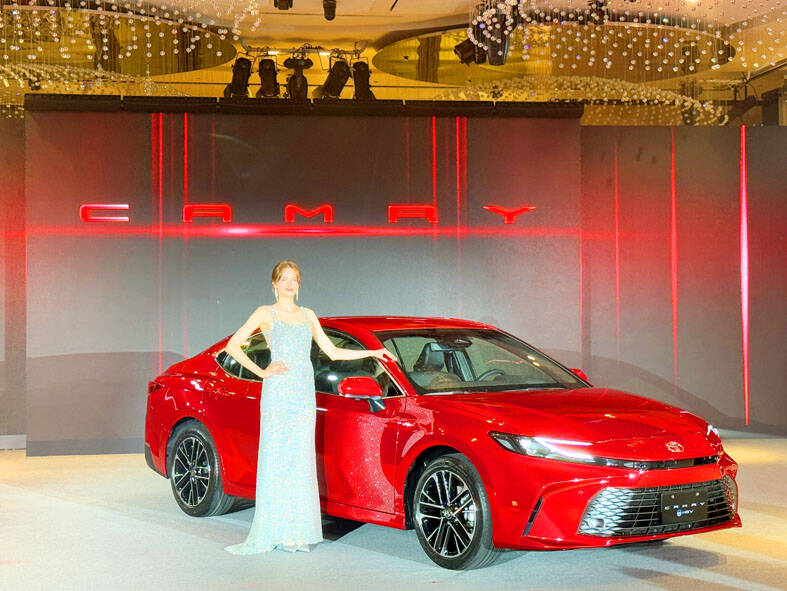Hotai Motor Co (和泰汽車), which distributes Lexus and Toyota vehicles in Taiwan, yesterday said it would back and comply with the government’s adoption of new curbs on cheaper auto components, mainly from China, to avert potential unfair competition.
The Industrial Development Administration last year expressed concern over the issue amid fears that it could affect the local market and lead to unfair competition, Hotai spokesman Lai Chih-wei (賴志偉) told investors at its earnings conference in Taipei.
“We were not surprised about the implementation of the new rules in August since the administration had long been talking with local automakers” about the issue, Lai said.

Photo: Amy Yang, Taipei Times
“Our stance is that we support and will fully comply with the regulations,” he said.
Hotai holds a 30 percent stake in Kuozui Motors Ltd (國瑞汽車), which assembles Toyota vehicles in Taiwan, with a majority of the auto parts sourced locally.
The government’s decision to tighten car assembly rules has sparked discussion about the legitimacy of the new regulations, although Hotai and China Motor Corp (中華汽車), which would suffer the brunt of the policy, have voiced their support.
The new regulations require automakers to increase the share of locally manufactured components in new vehicles, which must account for 15 percent of total car parts during the first year, 25 percent in the second year and 35 percent in the third year.
China Motor has to reschedule the launches of new electric vehicles from China’s GM Motor and SAIC Maxus Automotive Co (上汽大通汽車). China Motor assembles and sells GM cars in Taiwan, with up to 90 percent of the components imported from China.
Hotai yesterday retained its full-year business outlook, aiming to sell 170,000 vehicles, including Toyota, Lexus and Hino cars, this year, Lai said.
That means the company’s unit sales would hit an all-time high for a second straight year, following last year’s 166,000 units, he said.
Hotai has accumulated an order backlog of more than 10,000 vehicles due to strong demand, Lai said.
Hotai early this year set a goal to increase its domestic market share to 37.8 percent this year from 34.9 percent last year.
“We are expecting launches of new vehicles and revamped models to stimulate car sales and to grab more market share in the second half,” Lai said.
The company also maintained its forecast that new vehicle sales in Taiwan would reach 450,000 units this year, Lai said.
Hotai is cautious about vehicles sales next year, as the government’s tax incentives for new car purchases are to end at the end of next year, he said.
The company reported that net profit in the first half of the year contracted about 3 percent year-on-year to NT$11.76 billion (US$368.1 million), from NT$12.11 billion in the same period last year. Earnings per share dropped to NT$21.1 from NT$21.74.
The company attributed the decline to a higher base last year, as it was granted a higher quota of Lexus vehicles from Toyota Motor Corp after vehicle production returned to normalcy after the COVID-19 pandemic.

Sweeping policy changes under US Secretary of Health and Human Services Robert F. Kennedy Jr are having a chilling effect on vaccine makers as anti-vaccine rhetoric has turned into concrete changes in inoculation schedules and recommendations, investors and executives said. The administration of US President Donald Trump has in the past year upended vaccine recommendations, with the country last month ending its longstanding guidance that all children receive inoculations against flu, hepatitis A and other diseases. The unprecedented changes have led to diminished vaccine usage, hurt the investment case for some biotechs, and created a drag that would likely dent revenues and

Global semiconductor stocks advanced yesterday, as comments by Nvidia Corp chief executive officer Jensen Huang (黃仁勳) at Davos, Switzerland, helped reinforce investor enthusiasm for artificial intelligence (AI). Samsung Electronics Co gained as much as 5 percent to an all-time high, helping drive South Korea’s benchmark KOSPI above 5,000 for the first time. That came after the Philadelphia Semiconductor Index rose more than 3 percent to a fresh record on Wednesday, with a boost from Nvidia. The gains came amid broad risk-on trade after US President Donald Trump withdrew his threat of tariffs on some European nations over backing for Greenland. Huang further

CULPRITS: Factors that affected the slip included falling global crude oil prices, wait-and-see consumer attitudes due to US tariffs and a different Lunar New Year holiday schedule Taiwan’s retail sales ended a nine-year growth streak last year, slipping 0.2 percent from a year earlier as uncertainty over US tariff policies affected demand for durable goods, data released on Friday by the Ministry of Economic Affairs showed. Last year’s retail sales totaled NT$4.84 trillion (US$153.27 billion), down about NT$9.5 billion, or 0.2 percent, from 2024. Despite the decline, the figure was still the second-highest annual sales total on record. Ministry statistics department deputy head Chen Yu-fang (陳玉芳) said sales of cars, motorcycles and related products, which accounted for 17.4 percent of total retail rales last year, fell NT$68.1 billion, or

HSBC Bank Taiwan Ltd (匯豐台灣商銀) and the Taiwan High Prosecutors Office recently signed a memorandum of understanding (MOU) to enhance cooperation on the suspicious transaction analysis mechanism. This landmark agreement makes HSBC the first foreign bank in Taiwan to establish such a partnership with the High Prosecutors Office, underscoring its commitment to active anti-fraud initiatives, financial inclusion, and the “Treating Customers Fairly” principle. Through this deep public-private collaboration, both parties aim to co-create a secure financial ecosystem via early warning detection and precise fraud prevention technologies. At the signing ceremony, HSBC Taiwan CEO and head of banking Adam Chen (陳志堅)